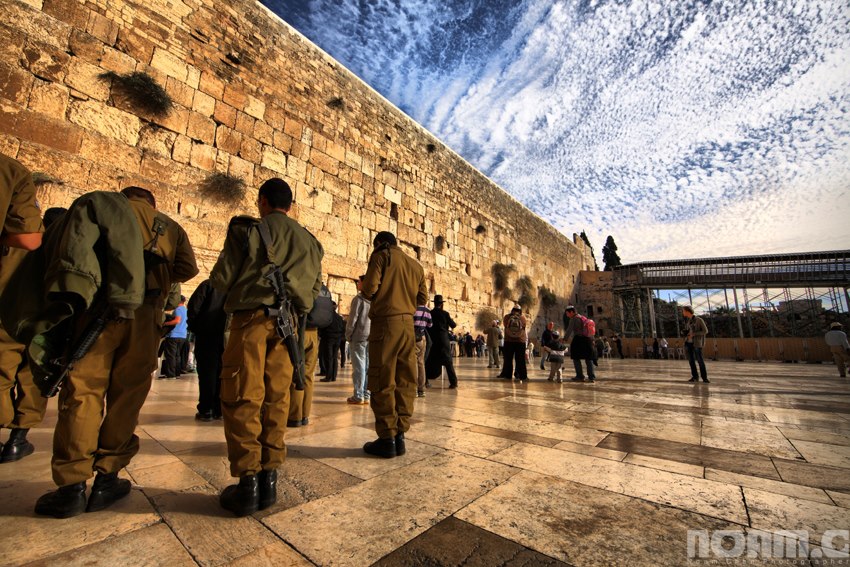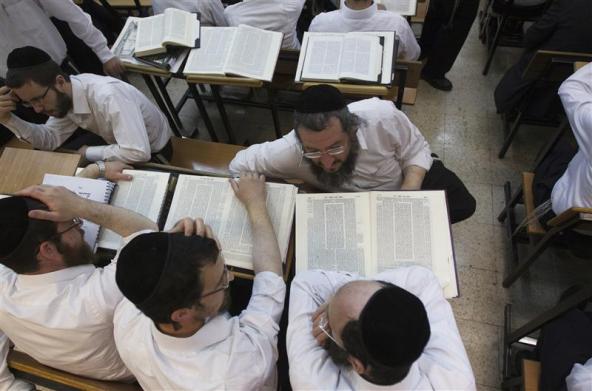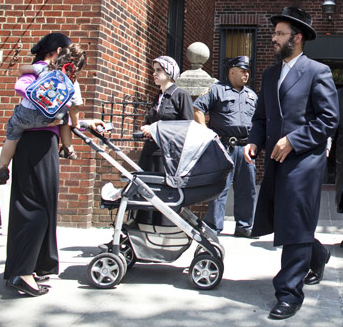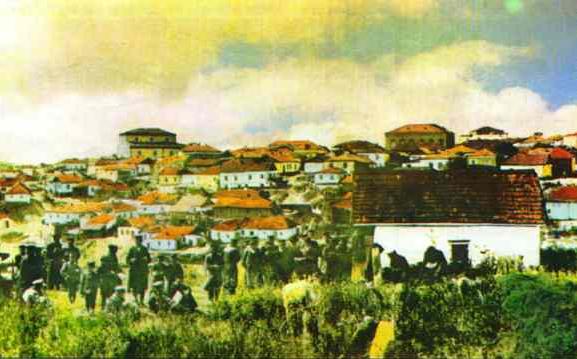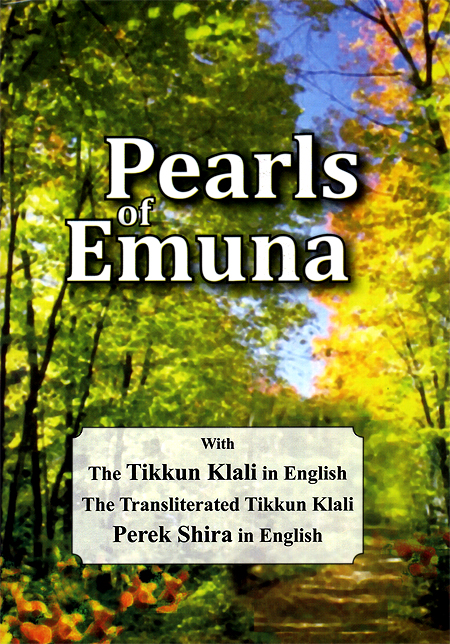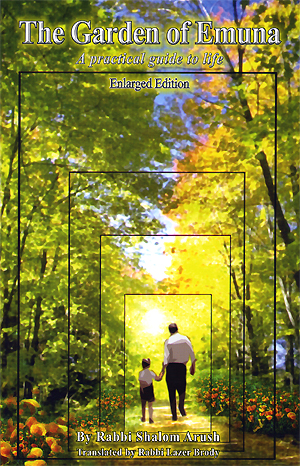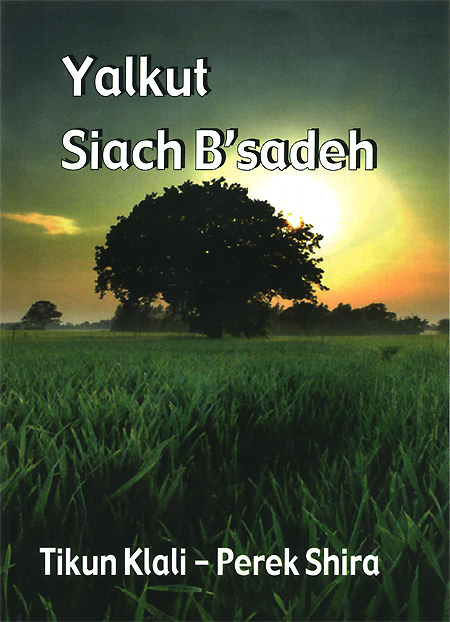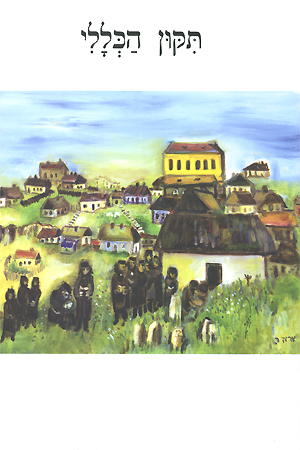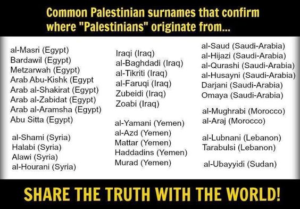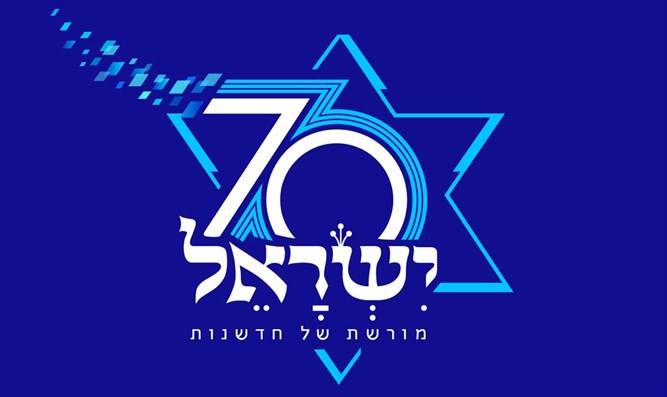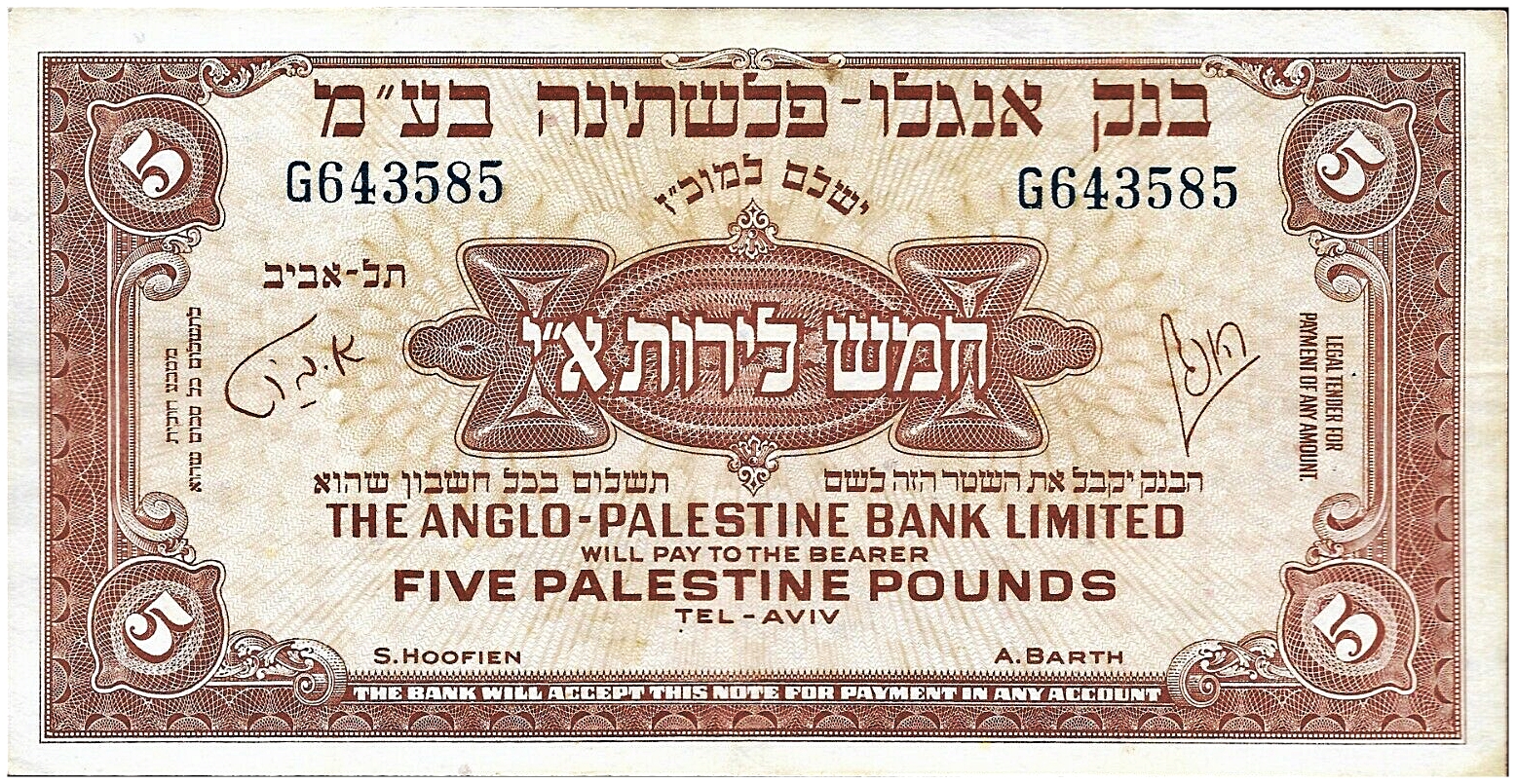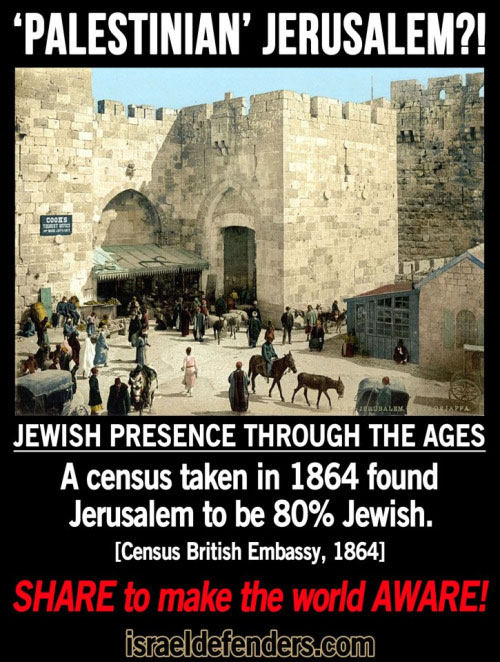The Amazing Tikkun KlaliWe are all Soldiers in Hashem’s (G-D’s) Army. Whether with a Gun,Gamorah or Stroller |
|
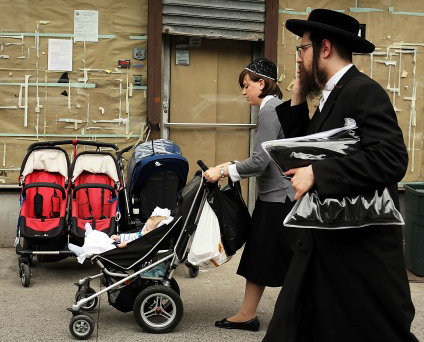 |
|
| By: Shai Mor The Tikkun HaKlali consists of ten particular Psalms (16, 32, 41, 42, 59, 77, 90, 105, 137, and 150).I have been telling my chavrutot how I have seen amazing salvations in everyday challenges from reading Tikkun HaKlali.I was told by my wife that it is important to tell stories of siyata deshemaya, Hashem’s loving assistance: A week and a half ago on erev Shabbat, I did not know that the ferry schedule was different in the middle of the day and instead of taking what I thought would be a 10 minute ferry ride at 2:40 to get to a 2:54 train, I found out that the ferry would not come until 2:45. The next train would be at 3:29 and give me very little time to get ready and help at home for Shabbat. I started thinking how much of a burden it would be for my wife and started praying to Hashem not to give my wife this test. The yid standing next to me waiting for the ferry said he was hoping to make the same train. He said “forget about it”, “you shouldn’t even have a hope of making it”. I know from the teachings of Rav Arush and Rebbe Nachman that Hashem controls everything. When I got into the ferry I sat down and decided to start reciting Tikkun Haklali. Hashem has answered me for almost everything that I have asked for after saying Tikkun HaKlali and I know if he did not answer that thing wasn’t good for me. I said it and did not look outside to be mimaet the ness. The ferry should have arrived in 8 min and it usually takes the crew a minute or two until people can get off. Not only did we make it to the train, but we were on the train a minute early. One Sunday I went downstairs to learn a little before the kids would wake up. Our baby started crying just as I started learning. I went upstairs and took the baby to our room. It may have not been the best thing, the baby started crying worse. My wife told me to go downstairs and continue learning. I felt bad. I said the Tikkun HaKlali and when I got to the second kapital, the baby stopped crying. This is from Rabbi Yossi Mizrachi of Monsey: He said that he knows a baal teshuva that used to be a theif. He would say the Tikkun HaKlali before he would try to commit a crime. He complained to Rabbi Mizrachi, “but it never worked.” Rabbi Mizrachi said “You idiot, of course it worked. It saved you for getting in trouble.” |
|
|
Rebbe Nachman’s TikkunBy: Rabbi Dovid Shapiro The prophet Yeshayahu (Isaiah) (60:20) says “And your people are all tzaddikim, righteous.” The Zohar (I:93a) asks how is it possible to say that all Jews are tzaddikim when we see some are not and then answers that that they belong to the category of tzaddikim because the are circumcised and they circumcise their children. But this Brit, this covenant between a Jew and his Creator, does not end with circumcision. In that same Likutei Moharan, Rebbe Nachman also says that every Jew who guards his Brit is considered a tzaddik relative to another Jew who is not at the same level when it comes to guarding his Brit. Circumcision is the first step in bringing a Jewish man into the category of “Tzaddik” and without that mitzvah he cannot relate to the truly great Tzaddikim. He must continue to guard and sanctify the mark of circumcision by avoiding misuse of that part of his body which at the time of his Brit was dedicated to purity and sanctity. In Likutei Moharan (I:2 and I:130) Rebbe Nachman quotes the Zohar stating that the yetzer hara, the evil inclination, focuses its influence on moral issues. Someone once spoke highly of a certain Tzaddik to Rebbe Nachman. Rebbe Nachman responded, “How is he with that desire?” The Chassid replied “How can anyone know about that?” Rebbe Nachman responded, “But that is the main thing. All the other desires can easily be subdued but the true measure of a Tzaddik is to what extent he has purified himself in that desire” (Chayei Moharan 601). In Likutei Halachot (Hilchot Kidushin 3:3; Hilchot Nachalot 3:2), Reb Natan writes that there are thousands and tens of thousands of levels in sanctifying one’s Brit. And although everyone should pray and strive for perfection, the first level is to observe all the laws of the Torah (written and oral) concerning matters of morality and marital relations. Rebbe Nachman (Likutei Moharan I:11) points out that there are two ways of guarding of the Brit: through refraining from the prohibitions stated in the Torah, and through sanctifying oneself beyond that. The first category (refraining from the prohibitions) is called “lower unity (yichuda tata’a)” and corresponds to Boruch Shem, Blessed is His name. The second category is called “higher unity (Yichuda Ila’a) and corresponds to Shma Yisroel, Hear O Israel. The Torah does not expect every Jew to achieve the purity of the greatest tzaddikim. At the same time, we must realize that our level of purity need not remain static, and that we are expected to constantly continue to purify and elevate ourselves, in thought, word, and deed. In Likutei Moharan II:48, Rebbe Nachman writes that every movement that brings a person out of physicality and closer to God is “very precious.” If a person progresses even a minute amount, in the higher world he has traversed huge distances. Rebbe Nachman illustrated this with a story (Rabbi Nachman’s Stories #16, “The Melancholy Saint”) about a Tzaddik who flew many miles in the upper worlds, but when he returned to earth, found that he was very close to his original starting point. Since a person’s spiritual level is not static, in addition to being able to elevate ourselves, we are in danger of falling. It’s important to learn to deal with that possibility and to do everything in our power to assure that if we do fall, we will not exceed the minimal boundaries set by the Torah. At the same time, when we fall, we must never lose hope of elevating ourselves to higher levels, and even surpassing our previous levels. Very often, a decline is preparation for a significant ascent, as Rebbe Nachman and Reb Natan often remind us in their writings. If a person failed to break his fall in time and has transgressed clear prohibitions, he must be prepared to deal even with this. In Likutei Moharan II:12, Rebbe Nachman tells us that when one is in the lowest of depths, stuck in the mire, he has a special opportunity to find the highest levels of holiness which are hidden there – but only if he is firmly resolved to search for God. Rebbe Nachman states (Sichot Haran 71) that the Zohar should not be understood literally. Repentance always helps, and the main thing is not to repeat one’s wrong doing. Rebbe Nachman declared that one can completely rectify this sin if after repenting he goes to the mikveh and then recites ten particular Psalms (16, 32, 41, 42, 59, 77, 90, 105, 137, 150) to rectify the damage of that transgression. (Earlier tzaddikim attempted to find ways to rectify this sin. See for example the Shl”a and Yesod Yosef, written by Rabbi Yosef ben Shlomo of Posen, dealing mainly with this topic. But they would not guarantee that their recommendations would completely correct the problem). Afterwards, a person should continue striving towards perfection without worrying about this episode. In addition, Rebbe Nachman stated that these ten Psalms have a special power and declared before two witnesses that if a person recites these Psalms at his grave in Uman and donates a pruta (a tiny amount of money) to charity in Rebbe Nachman’s honor, then Rebbe Nachman will make every effort to help that person escape from the depths, no matter how deeply he had fallen. |
|
Tikkun HaKlali – The Ten Psalms:Prayers of the heart, the words we speak in hitbodedut should be said in our own languages. Prayers from the siddurs, taught to us by our Sages and Rabbis should be recited in Hebrew. Nevertheless if one cannot read Hebrew he is still merited for saying the equivalence in English. (The Ten Psalms in English can be found in an English – Hebrew Psalms book; the chapters are: 16, 32, 41, 42, 59, 77, 90, 105, 137, 150.) |
|
| רָצוֹן מִלְּפָנֶיךָ יְיָ אֱלֹהֵינוּ ואֱלֹהֵי אֲבוֹתֵינוּ הַבּוֹחֵר בְּדָוִד עַבְדוֹ וּבְזַרְעוֹ אַחֲרָיו וְהַבּוֹחֵר בְּשִׁירוֹת וְתִשְׁבָּחוֹת, שֶׁתֵּפֶן בְּרַחֲמִים אֶל קְרִיאַת מִזְמוֹרֵי תְּהִלִּים שֶׁאֶקְרָא כְּאִלּוּ אֲמָרָם דָּוִד הַמֶּלֶךְ עָלָיו הַשָּׁלוֹם בְּעַצְמוֹ זְכוּתוֹ יָגֵן עָלֵינוּ. וְיַעֲמָד לָנוּ זְכוּת פְּסוּקֵי תְּהִלִּים וּזְכוּת תֵּבוֹתֵיהֶם וְאוֹתִיוֹתֵיהֶם וּנְקֻדּוֹתֵיהֶם וְטַעֲמֵיהֶם וְהַשֵּׁמוֹת הַיּוֹצְאִים מֵהֶם מֵרָאשֵׁי תֵּבוֹת וּמִסּוֹפֵי תֵּבוֹת, לְכַפֵּר פְּשָּׁעֵינוּ וַעֲוֹנוֹתֵינוּ וְחַטֹּאתֵינוּ, וּלְזַמֵּר עָרִיצִים וּלְהַכְרִית כָּל הַחוֹחִים וְהַקּוֹצִים הַסּוֹבְבִים אֶת הַשּׁוֹשַׁנָּה הָעֶלְיוֹנָה, וּלְחַבֵּר אֵשֶׁת נְעוּרִים עִם דּוֹדָהּ בְּאַהֲבָה וְאַחֲוָה וְרֵעוּת, וּמִשָּׁם יִמָּשֵׁךְ לָנוּ שֶׁפַע לְנֶפֶשׁ רוּחַ וּנְשָׁמָה לְטַהֲרֵנוּ מֵעֲוֹנוֹתֵינוּ וְלִסְלֹחַ חַטֹּאתֵינוּ וּלְכַפֵּר פְּשָּׁעֵינוּ, כְּמוֹ שֶׁסָלַחְתָּ לְדָוִד שֶׁאָמַר מִזְמוֹרִים אֵלּוּ לְפָנֶיךָ, כְּמוֹ שֶׁנֶּאֱמַר גַּם יְיָ הֶעֱבִיר חַטָּאתְךָ לֹא תָּמוּת. וְאַל תִּקָּחֵנוּ מֵהָעוֹלָם הַזֶּה קֹדֶם זְמַנֵּנוּ עַד מְלֹאת שְנוֹתֵינוּ בָּהֶם שִׁבְעִים שָׁנָה בְּאֹפֶן שֶׁנּוּכַל לְתַקֵּן אֵת אָשֵׁר שִׁחַתְנוּ. וּזְכוּת דָּוִד הַמֶּלֶךְ עָלָיו הַשָּׁלוֹם יָגֵן עָלֵינוּ ?בַּעֲדֵנוּ שְׁתַּאֲרִיךְ אַפְּךָ עַד שׁוּבֵנוּ אֵלֶיךָ בִּתְשׁוּבָה שְׁלֵמָה לְפָנֶיךָ. וּמֵאוֹצַר מַתְּנַת חִנָּם חֲנָנוֹ, כְּדִּכְתִיב וְחַנּוֹתִי אֶת אֲשֶׁר אָחֹן וְרִחַמְתִּי אֶת אָשֵׁר אֲרַחֵם. וּכְשֵׁם שֶׁאָנוּ אוֹמְרִים לְפָנֶיךָ שִׁירָה בָּעוֹלָם הַזֶּה כָּךְ נִזְכֶּה לוֹמַר לְפָנֶיךָ יְיָ אֱלֹהֵינוּ שִׁיר וּשְׁבָחָה לָעוֹלָם הַבָּא. וְעַל יְדֵי אֲמִירַת תְּהִלִּים תִּתְעוֹרֵר חֲבַצֶּלֶת הַשָּׁרוֹן וְלָשִׁיר בְּקוֹל נָעִים בְּגִילַת וְרַנֵּן, כְּבוֹד הַלְּבָנוֹן נִתָּן לָהּ, הוֹד וְהָדָר בְּבֵית אֱלֹהֵינוּ בִּמְהֵרָה בְּיָמֵינוּ אָמֵן סֶלָה: | |
| Translation:Our G-D and G-d of our fathers:Who chooses King David and his descendants; who chooses songs and praises. Please turn to me in mercy and accept the Psalms I am going to say as if King David himself were saying them, and let his merit protect us.There is merit in every verse of the Psalms and in every word, in their letters, vowels and notes and in all the holy names spelled out by the first and last letters of each Hebrew word.Let this merit stand in our favor to atone for our sins and transgressions, cut down our enemies and accusers on High, and destroy all the thorns and thistles surrounding the Supernal Rose. Send down blessing from Your exalted place to all the levels of our soul and spirit, to purify us from our sins, forgive our transgressions and atone for our rebellion, just as You forgave King David who recited these psalms before You. “And G-D will cause your sin to pass away and you will not die” (Samuel II 12:13).Do not take us from this world before our time. Give us a full life throughout our span of seventy years so that we can make amends for all the wrong we have done.May the merit of King David protect us, and be patient with us until we return to You in perfect repentance.Grant us blessing from Your treasury of open-handed generosity, as it is written: “I will be gracious to whom I will be gracious, and I will show mercy to whom I will show mercy” (Exodus 33:19). Just as we sing before You in this world, grant us the privilege of singing before You, G-D, in the World to Come. Through our recital of the psalms, let pleasant song break forth with rejoicing and exultation. Let glory be given to Israel; and splendor and beauty shall be in the House of G-D. Bring it speedily in our days, Amen. Before reciting the Tikkun HaKlali, it is good to say the following: |
|
| לְכוּ נְרַנְּנָה לַיהֹוָה, נָרִיעָה לְצוּר יִשְׁעֵנוּ: נְקַדְּמָה פָּנָיו בְּתוֹדָה, בִּזְמִרוֹת נָרִיעַ לוֹ: כִּי אֵל גָּדוֹל יְהֹוָה, וּמֶלֶךְ גָּדוֹל עַל כָּל אֱלֹהִים: הֲרֵינִי מְזַמֵּן אֶת פִּי לְהוֹדוֹת וּלְהַלֵּל וּלְשַׁבֵּחַ אֶת בּוֹרְאִי לְשֵׁם יִחוּד קֻדְשָׁא בְּרִיךְ הוּא וּשְׁכִינְתֵּה בִּדְחִילוּ וּרְחִימוּ עַל יְדֵי הַהוּא טָמִיר וְנֶעְלָם בְּשֵׁם כָּל יִשְׂרָאֵל:טוֹב לוֹמַר זֹאת לִפְנֵי אֲמִירַת הָעֲשָׂרָה מִזְמוֹרִיםהֲרֵינִי מְקַשֵׁר עַצְמִי בַּאֲמִירַת הָעֲשָׂרָה מִזְמוֹרִים אֵלּוּ לְכָל הַצַּדִּיקִים הָאֲמִתִּיִּים שֶׁבְּדוֹרֵנוּ. וּלְכָל הַצַּדִּיקִים הָאֲמִתִּים שׁוֹכְנֵי עָפָר. קְדוֹשִׁים אָשֵׁר בָּאָרֶץ הֵמָּה. וּבִפְרָט לְרַבֵּנוּ הַקָּדוֹשׁ צַדִּיק יְסוֹד עוֹלָם נַחַל נוֹבֵעַ מְקוֹר חָכְמָה רַבֵּנוּ נַחְמָן בֶּן פֵיגֶא. זְכוּתָם יָגֵן עָלֵינוּ וְעַל כָּל יִשְׂרָאֵל אָמֵן. |
|
| Translation:In saying these ten psalms I am binding myself to all the true Tzaddikim in this generation and all the true Tzaddikim who have departed, “the holy ones who are in the earth”, and especially our holy Rebbe, Tzaddik, foundation of the world, the “flowing brook, source of wisdom”, Rabbi Nachman the son of Feiga, (may his merit protect us,) who revealed this remedy.Come let us sing to G-D, let us shout for joy to the Rock of our salvation. Let us come before His presence with thanksgiving; let us sing to Him joyously in song. For GOD is a great GOD and a great King over all gods (Psalms 95:1-3).I prepare my mouth to give thanks and praise to my Creator, to unify the Holy One, blessed-be-he, and His Shechinah in awe and love, through the Hidden and Concealed One, in the name of all Israel. | |
| וְעַל דַּעְתָּם וְעַל כַּוָּנָתָם אֲנִי אוֹמֵר כָּל אֵלּוּ הָעֲשָׂרָה קַפִּיטְל תְּהִלִּים, וּבִזְכוּתָם וְכֹחָם אֶזְכֶּה לְעוֹרֵר וּלְגַלּוֹת כָּל הָעֲשָׂרָה מִינֵי נְגִינָה שֶׁנֶּאֱמַר בָּהֶם סֵפֶר תְּהִלִּים, שֶׁהֵם: אַשְׁרֵי, בְּרָכָה, מַשְׂכִּיל, שִׁיר, נִצּוּחַ, נִגּוּן, תְּפִלָּה, הוֹדָאָה, מִזְמוֹר, הַלְלוּיָהּ. שֶׁהֵם שִׁיר פָּשׁוּט, כָּפוּל, מְשֻׁלָּש, מְרֻבָּע, שֶׁהֵם כְּלוּלִים בְּשִׁמְךָ הַמְיֻחָד הַגָּדוֹל וְהַקָדוֹשׁ. וּבִזְכוּת וְכֹחַ הַשְׁנֵי שְׁמוֹת הַקְּדוֹשִׁים הָאֵלּוּ בְּמִלּוּאָם, שֶׁהֵם אֵל אֱלֹהִים (כָּזֶה): אל”ף למ”ד, אל”ף למ”ד ה”יְ יו”ד מ”ם, שֶׁהֵם עוֹלִים בְּמִסְפָּר תפ”ה, כְּמִסְפַּר תְּהִלִּים. בְּכֹחַ אֵלוּ הַשֵּׁמוֹת תְּזַכֵּנִי לְתִקּוּן הַבְּרִית שֶׁהוּא תִּקּוּן הַכְּלָלִי אָמֵן:מיוסד ע”פ התפילה של רבי נתן זיע”א ונראה שחשוב וכדאי לאומרו לפני התיקון הכלליטז מִכְתָּם לְדָוִד, שָׁמְרֵנִי אֵל כִּי חָסִיתִי בָךְ: אָמַרְתְּ לַיהֹוָה, אֲדֹנָי אָתָּה, טוֹבָתִי בַּל עָלֶיךָ: לִקְדוֹשִׁים אֲשֶׁר בָּאָרֶץ הֵמָּה, וְאַדִּירֵי, כָּל חֶפְצִי בָם: יִרְבּוּ עַצְּבוֹתָם, אַחֵר מָהָרוּ, בַּל אַסִּיךְ נִסְכֵּיהֶם מִדָּם, וּבַל אֶשָּׂא אֶת שְׁמוֹתָם עַל שְׂפָתַי: יְהֹוָה מְנָת חֶלְקִי וְכוֹסִי, אַתָּה תּוֹמִיךְ גּוֹרָלִי: חֲבָלִים נָפְלוּ לִי בַּנְּעִמִים, אַף נַחֲלַת שָׁפְרָה עָלָי: אַבְרֵךְ אֶת יְהֹוָה, אָשֵׁר יְעָצָנִי, אַף לֵילוֹת יִסְּרוּנִי כִלְיוֹתָי: שִׁוִּיתִי יְהֹוָה לְנֶגְדִּי תָּמִיד, כִּי מִימִינִי בַּל אֶמּוֹט: לָכֵן שָׂמַח לִבִּי, וְיָּגֵל כְּבוֹדִי, אַף בְּשָׂרִי יִשְׁכֹּן לָבֶטַח: כִּי לֹא תַעֲזֹב נַפְשִׁי לִשְׁאוֹל, לֹא תִתֵּן חֲסִידְךָ לִרְאוֹת שָׁחַת: תּוֹדִיעֵינִי אֹרַח חַיִּים, שֹׂבַע שְׂמָחוֹת אֶת פָּנֶיךָ, נְעִמוֹת בִּימִינְךָ נֶצַח:לב לְדָוִד מַשְׂכִּיל, אַשְׁרֵי נְשׂוּי פֶּשַׁע, כְּסוּי חֲטָאָה: אַשְׁרֵי אָדָם לֹא יַחְשֹׁב יְהֹוָה לוֹ עָוֹן, וְאֵין בְּרוּחוֹ רְמִיָּה: כִּי הֶחֱרַשְׁתִּי, בָּלוּ עֲצָמָי, בְּשַׁאֲגָתִי כָּל הַיּוֹם: כִּי יוֹמָם וָלַיְלָה תִּכְבַּד עָלַי יָדֶךָ, נֶהְפַּךְ לְשַׁדִּי, בְּחַרְבֹנֵי קַיִץ סֶלָה: חַטָּאתִי אוֹדִיעֲךָ, וַעֲוֹנִי לֹא כִסִּיתִי, אָמַרְתִּי, אוֹדֶה עֲלֵי פְשָׁעַי לַיהֹוָה, וְאַתָּה נָשָׂאתָ עֲוֹן חַטָּאתִי סֶלָה: עַל זֹאת יִתְפַּלֵּל כָּל חָסִיד אֵלֶיךָ, לְעֵת מְצֹא, רַק לְשֵׁטֶף מַיִם רַבִּים אֵלָיו לֹא יַגִּיעוּ: אַתָּה סֵתֶר לִי*), מִצַּר תִּצְּרֵנִי, רָנֵּי פַלֵּט תְּסוֹבְבֵנִי סֶלָה: אַשְׂכִּילְךָ, וְאוֹרְךָ בְּדֶרֶךְ זוּ תֵלֵךְ, אִיעֲצָה עָלֶיךָ עֵינִי: אַל תִּהְיוּ כְּסוּס, כְּפֶרֶד, אֵין הָבִין, בְּמֶתֶג וָרֶסֶן עֶדְיוֹ לִבְלוֹם, בַּל קְרֹב אֵלֶיךָ: רַבִּים מַכְאוֹבִים לָרָשָׁע, וְהַבּוֹטֵחַ בַּיהֹוָה חֶסֶד יְסוֹבְבֶנּוּ: שִׂמְּחוּ בַיהֹוָה, וְגִילוּ צַדִּיקִים, וְהַרְנִינוּ כָּל יִשְׁרֵי לֵב:*) כאן צריך להפסיק מעט. (עין בליקוטי מוהר”ן חלק א’ סימן רי”ג).מא לַמְנַצֵּחַ מִזְמוֹר לְדָוִד: אַשְׁרֵי מַשְׂכִּיל אֶל דָּל, בְּיוֹם רָעָה יְמַלְּטֵהוּ יְהֹוָה: יְהֹוָה יִשְׁמְרֵהוּ וִיחַיֵּהוּ, וְאֻשַּׁר בָּאָרֶץ, וְאַל תִּתְּנֵהוּ בְּנֶפֶשׁ אֹיְבָיו: יְהֹוָה יִסְעָדֶנּוּ עַל עֶרֶשׂ דְּוָי, כָּל מִשְׁכָּבוֹ הָפַכְתָּ בְחָלְיוֹ: אֲנִי אָמַרְתִּי, יְהֹוָה חָנֵּנִי, רְפָאָה נַפְשִׁי כִּי חָטָאתִי לָךְ: אוֹיְבַי יֹאמְרוּ רַע לִי, מָתַי יָמוּת וְאָבַד שְׁמוֹ: וְאִם בָּא לִרְאוֹת, שָׁוְא יְדַבֵּר, לִבּוֹ יִקְבָּץ אָוֶן לוֹ, יֵצֵא לַחוּץ יְדַבֵּר: יַחַד עָלַי יִתְלַחֲשׁוּ כָּל שֹׂנְאָי, עָלַי יַחְשְׁבוּ רָעָה לִי: דְּבַר בְּלִיַּעַל יָצוּק בּוֹ, וַאֲשֶׁר שָׁכַב לֹא יוֹסִיף לָקוּם: גַּם אִישׁ שְׁלוֹמִי, אֲשֶׁר בָּטַחְתִּי בוֹ אוֹכֵל לַחְמִי, הִגְדִּיל עָלַי עָקֵב: וְאַתָּה יְהֹוָה, חָנֵּנִי וְהֲקִימֵנִי, וַאֲשַׁלְּמָה לָהֶם: בְּזֹאת יָדַעְתִּי כִּי חָפַצְתָּ בִּי, כִּי לֹא יָרִיעַ אֹיְבִי עָלָי: וַאֲנִי בְּתֻמִּי תָּמַכְתָּ בִּי, וַתַּצִּיבֵנִי לְפָנֶיךָ לְעוֹלָם: בָּרוּךְ יְהֹוָה, אֱלֹהֵי יִשְׂרָאֵל, מֵהָעוֹלָם וְעַד הָעוֹלָם אָמֵן וְאָמֵן:מבלַמְנַצֵּחַ מַשְׂכִּיל, לִבְנֵי קֹרַח: כְּאַיָּל תַּעֲרֹג עַל אֲפִיקֵי מַיִם, כֵּן נַפְשִׁי תַּעֲרֹג אֵלֶיךָ אֱלֹהִים: צָמְאָה נַפְשִׁי לֵאלֹהִים, לְאֵל חָי, מָתַי אָבוֹא וְאֵרָאֶה פְּנֵי אֱלֹהִים: הָיְתָה לִי דִמְעָתִי לֶחֶם יוֹמָם וָלַיְלָה, בֶּאֱמֹר אֵלַי כָּל הַיּוֹם, אַיֵּה אֱלֹהֶיךָ: אֵלֶּה אֶזְכְּרָה, וְאֶשְׁפְּכָה עָלַי נַפְשִׁי, כִּי אֶעֱבֹר בַּסַּךְ, אֶדַּדֵּם עַד בֵּית אֱלֹהִים בְּקוֹל רִנָּה וְתוֹדָה, הָמוֹן חוֹגֵג: מַה תִּשְׁתּוֹחֲחִי נַפְשִׁי וַתֶּהֱמִי עָלָי, הוֹחִילִי לֵאלֹהִים, כִּי עוֹד אוֹדֶנּוּ יְשׁוּעוֹת פָּנָיו: אֱלֹהַי, עָלַי נַפְשִׁי תִשְׁתּוֹחָח, עַל כֵּן אֶזְכָּרְךָ מֵאֶרֶץ יַרְדֵּן וְחֶרְמוֹנִים, מֵהַר מִצְעָר: תְּהוֹם אֶל תְּהוֹם קוֹרֵא, לְקוֹל צִנּוֹרֶיךָ, כָּל מִשְׁבָּרֶיךָ וְגַלֶּיךָ עָלַי עָבָרוּ: יוֹמָם יְצַוֶּה יְהֹוָה חַסְדּוֹ, וּבַלַּיְלָה שִירֹה עִמִּי, תְּפִלָּה לְאֵל חַיָּי: אוֹמְרָה לְאֵל סַלְעִי, לָמָה שְׁכַחְתָּנִי, לָמָּה קֹדֵר אֵלֵךְ בְּלָחַץ אוֹיֵב: בְּרֶצַח בְּעַצְמוֹתַי, חֵרְפוּנִי צוֹרְרָי, בְּאָמְרָם אֵלַי כָּל הַיּוֹם אַיֵּה אֱלֹהֶיךָ: מַה תִּשְׁתּוֹחֲחִי נַפְשִׁי, וּמָה תֶּהֱמִי עָלָי, הוֹחִילִי לֵאלֹהִים, כִּי עוֹד אוֹדֶנּוּ יְשׁוּעֹת, פָּנַי וֵאלֹהָי:נט לַמְנַצֵּחַ, אַל תַּשְׁחֵת, לְדָוִד מִכְתָּם, בִּשְׁלֹחַ שָׁאוּל, וַיִשְׁמְרוּ אֶת הַבַּיִת לַהֲמִיתוֹ: הַצִּילֵנִי מֵאֹיבַי, אֱלֹהָי, מִּמִתְקוֹמְמַי תְּשַׂגְּבֵנִי: הַצִּילֵנִי מִפֹּעֲלֵי אָוֶן, וּמֵאַנְשֵׁי דָמִים הוֹשִׁיעֵנִי: כִּי הִנֵּה אָרְבוּ לְנַפְשִׁי, יָגוּרוּ עָלַי עַזִּים, לֹא פִשְׁעִי וְלֹא חַטָּאתִי יְהֹוָה: בְּלִי עָוֹן, יְרוּצוּן וְיִכּוֹנָנוּ, עוּרָה לִקְרָאתִי וּרְאֵה: וְאַתָּה יְהֹוָה אֱלֹהִים צְבָאוֹת, אֱלֹהֵי יִשְׂרָאֵל, הָקִיצָה לִפְקֹד כָּל הַגּוֹים, אַל תָּחֹן כָּל בֹּגְדֵי אָוֶן סֶלָה: יָשׁוּבוּ לָעֶרֶב, יֶהֱמוּ כַכָּלֵב, וִיסוֹבְבוּ עִיר: הִנֵּה יַבִּיעוּן בְּפִיהֶם, חֲרָבוֹת בְּשִׂפְתוֹתֵיהֶם, כִּי מִי שֹׁמֵעַ: וְאַתָּה יְהֹוָה תִּשְׂחַק לָמוֹ, תִּלְעַג לְכָל גּוֹיִם: עֻזּוֹ, אֵלֶיךָ אֶשְׁמֹרָה, כִּי אֱלֹהִים מִשְׂגַּבִּי: אֱלֹהֵי חַסְדִּי, יְקַדְּמֵנִי, אֱלֹהִים יַרְאֵנִי בְשֹׁרְרָי: אַל תַּהַרְגֵם פֶּן יִשְׁכְּחוּ עַמִּי, הֲנִיעֵמוֹ בְחֵילְךָ, וְהוֹרִידֵמוֹ, מָגִנֵּנוּ אֲדֹנָי: חַטַּאת פִּימוֹ, דְּבַר שְׂפָתֵימוֹ, וְיִלָּכְדוּ בִגְאוֹנָם, וּמֵאָלָה וּמִכַּחַשׁ יְסַפֵּרוּ: כַּלֵּה בְחֵמָה, כַּלֵּה, וְאֵינֵמוֹ, וְיֵדְעוּ כִּי אֱלֹהִים מֹשֵׁל בְּיַעֲקֹב לְאַפְסֵי הָאָרֶץ סֶלָה: וְיָשֻׁבוּ לָעֶרֶב, יֶהֱמוּ כַכָּלֵב, וִיסוֹבְבוּ עִיר: הֵמָּה יְנִיעוּן לֶאֱכֹל, אִם לֹא יִשְׂבְּעוּ, וַיָּלִינוּ: וַאֲנִי אָשִׁיר עֻזֶּךָ, וַאֲרַנֵּן לַבֹּקֶר חַסְדֶּךָ, כִּי הָיִיתָ מִשְׂגָּב לִי וּמָנוֹס בְּיוֹם צַר לִי: עֻזִּי, אֵלֶיךָ אֲזַמֵּרָה, כִּי אֱלֹהִים מִשְׂגַּבִּי אֱלֹהֵי חַסְדִּי:עז לַמְנַצֵּחַ עַל יְדוּתוּן לְאָסָף מִזְמוֹר: קוֹלִי אֶל אֱלֹהִים, וְאֶצְעָקָה קוֹלִי אֶל אֱלֹהִים, וְהַאֲזִין אֵלָי: בְּיוֹם צָרָתִי אֲדֹנָי דָּרָשְׁתִּי, יָדִי לַיְלָה נִגְּרָה, וְלֹא תָפוּג, מֵאֲנָה הִנָּחֵם נַפְשִׁי: אֶזְכְּרָה אֱלֹהִים, וְאֶהֱמָיָה, אָשִׂיחָה וְתִתְעַטֵּף רוּחִי סֶלָה: אָחַזְתָּ שְׁמֻרוֹת עֵינָי, נִפְעַמְתִּי וְלֹא אֲדַבֵּר: חִשַׁבְתִּי יָמִים מִקֶּדֶם, שְׁנוֹת עוֹלָמִים: אֶזְכְּרָה נְגִינָתִי בַּלַּיְלָה, עִם לְבָבִי אָשִׂיחָה, וַיְחַפֵּשׂ רוּחִי: הַלְעוֹלָמִים יִזְנַח אֲדֹנָי, וְלֹא יֹסִיף לִרְצוֹת עוֹד: הֶאָפֵס לָנֶצַח חַסְדּוֹ, גָּמַר אֹמֶר לְדֹר וָדֹר: הֲשָׁכַח חַנּוֹת אֵל, אִם קָפַץ בְּאַף רַחֲמָיו סֶלָה: וָאֹמֶר חַלוֹתִּי הִיא, שְׁנוֹת יְמִין עֶלְיוֹן: אֶזְכּוֹר מַעַלְלֵי יָהּ, כִּי אֶזְכְּרָה מִקֶּדֶם פִּלְאֶךָ: וְהָגִיתִי בְכָל פָּעֳלֶךָ, וּבַעֲלִילוֹתֶיךָ אָשִׂיחָה: אֱלֹהִים, בַּקֹּדֶשׁ דַּרְכְּךָ, מִי אֵל גָּדוֹל כֵּאלֹהִים: אַתָּה הָאֵל עֹשֵׂה פֶלֶא, הוֹדַעְתָּ בָעַמִּים עֻזֶּךָ: גָּאַלְתָּ בִּזְרוֹעַ עַמְּךָ, בְּנֵי יַעֲקֹב וְיוֹסֵף סֶלָה: רָאוּךָ מַּיִם אֱלֹהִים, רָאוּךָ מַּיִם יָחִילוּ, אַף יִרְגְּזוּ תְהֹמוֹת: זֹרְמוּ מַיִם עָבוֹת, קוֹל נָתְנוּ שְׁחָקִים, אַף חֲצָצֶיךָ יִתְהַלָּכוּ: קוֹל רַעַמְךָ בַּגַּלְגַּל, הֵאִירוּ בְרָקִים תֵּבֵל, רָגְזָה וַתִּרְעַשׁ הָאָרֶץ: בַּיָּם דַּרְכֶּךָ, וּשְׁבִילְךָ בְּמַיִם רַבִּים, וְעִקְּבוֹתֶיךָ לָא נֹדָעוּ: נָחִיתָ כַצֹּאן עַמֶּךָ, בְּיָד מֹשֶׁה וְאַהֲרֹן:צ תְּפִלָּה לְמֹשֶׁה, אִישׁ הָאֱלֹהִים, אֲדֹנָי מָעוֹן אַתָּה הָיִיתָ לָּנוּ בְּדֹר וָדֹר: בְּטֶרֶם הָרִים יֻלָּדוּ, וַתְּחוֹלֵל אֶרֶץ וְתֵבֵל, וּמֵעוֹלָם עַד עוֹלָם אַתָּה אֵל: תָּשֵׁב אֱנוֹשׁ עַד דַּכָּא, וַתֹּאמֶר, שׁוּבוּ בְנֵי אָדָם: כִּי אֶלֶף שָׁנִים בְּעֵינֶיךָ כְּיוֹם אֶתְמוֹל כִּי יַעֲבֹר, וְאַשְׁמוּרָה בַלָּיְלָה: זְרַמְתָּם שֵׁנָה יִהְיוּ, בַּבֹּקֶר כֶּחָצִיר יַחֲלֹף: בַּבֹּקֶר יָצִיץ, וְחָלָף, לָעֶרֶב יְמוֹלֵל וְיָבֵשׁ: כִּי כָלִינוּ בְאַפֶּךָ, וּבַחֲמָתְךָ נִבְהָלְנוּ: שַׁתָּה עֲוֹנֹתֵינוּ לְנֶגְדֶּךָ, עֲלֻמֵנוּ לִמְאוֹר פָּנֶיךָ: כִּי כָל יָמֵינוּ פָּנוּ בְעֶבְרָתֶךָ, כִּלִּינוּ שְׁנֵינוּ כְמוֹ הֶגֶה: יְמֵי שְׁנוֹתֵינוּ, בָהֶם שִׁבְעִים שָׁנָה, וְאִם בִּגְבוּרֹת שְׁמוֹנִים שָׁנָה, וְרָהְבָּם, עָמָל וָאָוֶן, כִּי גָז חִישׁ וַנָּעֻפָה: מִי יוֹדֵעַ, עֹז אַפֶּךָ, וּכְיִרְאָתְךָ, עֶבְרָתֶךָ: לִמְנוֹת יָמֵינוּ כֵּן הוֹדַע, וְנָבִא, לְבַב חָכְמָה: שׁוּבָה יְהֹוָה, עַד מָתָי, וְהִנָּחֵם עַל עֲבָדֶיךָ: שַׂבְּעֵנוּ בַבֹּקֶר, חַסְדֶּךָ, וּנְרַנְּנָה, וְנִשְׂמְחָה, בְּכָל יָמֵינוּ: שַׂמְּחֵנוּ, כִּימוֹת עִנִּיתָנוּ, שְׁנוֹת רָאִינוּ רָעָה: יֵרָאֶה אֶל עֲבָדֶיךָ פָעֳלֶךָ, וַהֲדָרְךָ עַל בְּנֵיהֶם: וִיהִי נֹעַם אֲדֹנָי אֱלֹהֵינוּ עָלֵינוּ, וּמַעֲשֶׂה יָדֵינוּ, כּוֹנְנָה עָלֵינוּ, וּמַעֲשֶׂה יָדֵינוּ כּוֹנְנֵהוּ:קה הוֹדוּ לַיהֹוָה, קִרְאוּ בִשְׁמוֹ, הוֹדִיעוּ בָעַמִּים עֲלִילוֹתָיו: שִׁירוּ לוֹ, זַמְּרוּ לוֹ, שִׂיחוּ בְּכָל נִפְלְאוֹתָיו: הִתְהַלְלוּ בְּשֵׁם קָדְשׁוֹ, יִשְׂמַח לֵב מְבַקְשֵׁי יְהֹוָה: דִּרְשׁוּ יְהֹוָה, וְעֻזּוֹ, בַּקְּשׁוּ פָנָיו תָּמִיד: זִכְרוּ נִפְלְאוֹתָיו אֲשֶׁר עָשָׂה, מֹפְתָיו וּמִשְׁפְּטֵי פִיו: זֶרַע אַבְרָהָם, עַבְדוֹ, בְּנֵי יַעֲקֹב, בְּחִירָיו: הוּא יְהֹוָה , אֱלֹהֵינוּ בְּכָל הָאָרֶץ מִשְׁפָּטָיו: זָכַר לְעוֹלָם בְּרִיתוֹ, דָּבָר צִוָּה, לְאֶלֶף דּוֹר: אֲשֶׁר כָּרַת אֶת אַבְרָהָם, וּשְׁבוּעָתוֹ לְיִשְׂחָק: וַיַּעֲמִידֶהָ לְיַעֲקֹב, לְחֹק, לְיִשְׂרָאֵל בְּרִית עוֹלָם: לֵאמֹר, לְךָ, אֶתֵּן אֶת אֶרֶץ כְּנָעַן, חֶבֶל נַחֲלַתְכֶם: בִּהְיוֹתָם מְתֵי מִסְפָּר, כִּמְעָט, וְגָרִים בָּה: וַיִּתְהַלְּכוּ מִגּוֹי אֶל גּוֹי, מִמַּמְלָכָה אֶל עַם אַחֵר: לֹא הִנִּיחַ אָדָם לְעָשְׁקָם, וַיּוֹכַח עֲלֵיהֶם מְלָכִים: אַל תִּגְּעוּ בִמְשִׁיחָי, וְלִנְבִיאַי אַל תָּרֵעוּ: וַיִּקְרָא רָעָב עַל הָאָרֶץ, כָּל מַטֵּה לֶחֶם שָׁבָר: שָׁלַח לִפְנֵיהֶם אִישׁ, לְעֶבֶד נִמְכָּר יוֹסֵף: עִנּוּ בַכֶּבֶל רַגְלוֹ, בַּרְזֶל בָּאָה נַפְשׁוֹ: עַד עֵת, בֹּא דְבָרוֹ, אִמְרַת יְהֹוָה, צְרָפָתְהוּ: שָׁלַח מֶלֶךְ, וַיַּתִּירֵהוּ, מֹשֵׁל עַמִּים, וַיְפַתְּחֵהוּ: שָׂמוֹ אָדוֹן לְבֵיתוֹ, וּמֹשֵׁל בְּכָל קִנְיָנוֹ: לֶאְסֹר שָׂרָיו, בְּנַפְשׁוֹ, וּזְקֵנָיו, יְחַכֵּם: וַיָּבֹא יִשְׂרָאֵל מִצְרָיִם, וְיַעֲקֹב גָּר בְּאֶרֶץ חָם: וַיֶּפֶר אֶת עַמּוֹ מְאֹד, וַיַּעֲצִמֵהוּ מִצָּרָיו: הָפַךְ לִבָּם לִשְׂנֹא עַמּוֹ, לְהִתְנַכֵּל בַּעֲבָדָיו: שָׁלַח מֹשֶׁה עַבְדוֹ, אַהֲרֹן אֲשֶׁר בָּחַר בּוֹ: שָׂמוּ בָם, דִּבְרֵי אֹתוֹתָיו, וּמֹפְתִים בְּאֶרֶץ חָם: שָׁלַח חֹשֶׁךְ, וַיַּחְשִׁךְ, וְלֹא מָרוּ אֶת דְּבָרוֹ: הָפַךְ אֶת מֵימֵיהֶם לְדָם, וַיָּמֶת אֶת דְּגָתָם: שָׁרַץ אַרְצָם צְפַרְדְּעִים, בְּחַדְרֵי מַלְכֵיהֶם: אָמַר, וְיָבֹא עָרֹב, כִּנִּים, בְּכָל גְּבוּלָם: נָתַן גִּשְׁמֵיהֶם בָּרָד, אֵשׁ לֶהָבוֹת בְּאַרְצָם: וַיַּךְ, גַּפְנָם וּתְאֵנָתָם, וַיְשַׁבֵּר עֵץ גְּבוּלָם: אָמַר, וַיָּבֹא אַרְבֶּה, וְיֶלֶק, וְאֵין מִסְפָּר: וַיֹּאכַל כָּל עֵשֶׂב בְּאַרְצָם, וַיֹּאכַל פְּרִי אַדְמָתָם: וַיַּךְ כָּל בְּכוֹר בְּאַרְצָם, רֵאשִׁית לְכָל אוֹנָם: וַיּוֹצִיאֵם בְּכֶסֶף וְזָהָב, וְאֵין בִּשְׁבָטָיו כּוֹשֵׁל: שָׂמַח מִצְרַיִם בְּצֵאתָם, כִּי נָפַל פַּחְדָּם עֲלֵיהֶם: פָּרַשׂ עָנָן, לְמָסָךְ, וְאֵשׁ, לְהָאִיר לָיְלָה: שָׁאַל, וַיָּבֵא שְׂלָיו, וְלֶחֶם שָׁמַיִם, יַשְׂבִּיעֵם: פָּתַח צוּר, וַיָּזוּבוּ מָיִם, הָלְכוּ בַּצִּיוֹת נָהָר: כִּי זָכַר אֶת דְּבַר קָדְשׁוֹ, אֶת אַבְרָהָם עַבְדוֹ: וַיּוֹצִא עַמּוֹ בְשָׂשׂוֹן, בְּרִנָּה אֶת בְּחִירָיו: וַיִּתֵּן לָהֶם אַרְצוֹת גּוֹיִם, וַעֲמַל לְאֻמִּים יִירָשׁוּ: בַּעֲבוּר יִשְׁמְרוּ חֻקָּיו, וְתוֹרֹתָיו יִנְצֹרוּ, הַלְלוּיָהּ:קלז עַל נְהָרוֹת בָּבֶל שָׁם יָשַׁבְנוּ, גַּם בָּכִינוּ בְּזָכְרֵנוּ אֶת צִיּוֹן: עַל עֲרָבִים בְּתוֹכָהּ, תָּלִינוּ כִּנֹרוֹתֵינוּ: כִּי שָׁם שְׁאֵלוּנוּ שׁוֹבֵינוּ דִּבְרֵי שִׁיר, וְתוֹלָלֵינוּ שִׂמְחָה, שִׁירוּ לָנוּ, מִשִּׁיר צִיּוֹן: אֵיךְ נָשִׁיר אֶת שִׁיר יְהֹוָה, עַל אַדְמַת נֵכָר: אִם אֶשְׁכָּחֵךְ יְרוּשָׁלַיִם, תִּשְׁכַּח יְמִינִי: תִּדְבַּק לְשׁוֹנִי לְחִכִּי, אִם לֹא אֶזְכְּרֵכִי, אִם לֹא אַעֲלֶה אֶת יְרוּשָׁלַיִם, עַל רֹאשׁ שִׂמְחָתִי: זְכֹר יְהֹוָה לִבְנֵי אֱדוֹם, אֵת יוֹם יְרוּשָׁלַיִם, הָאֹמְרִים, עָרוּ עָרוּ, עַד הַיְסוֹד בָּהּ: בַּת בָּבֶל הַשְׁדוּדָה, אַשְׁרֵי שֶׁיְּשַׁלֶּם לָךְ, אֶת גְּמוּלֵךְ שֶׁגָּמַלְתְּ לָנוּ: אַשְׁרֵי שֶׁיֹּאחֵז וְנִפֵּץ אֶת עֹלָלַיִךְ אֶל הַסָּלַע:קנ הַלְלוּיָהּ הַלְלוּ אֵל בְּקָדְשׁוֹ, הַלְלוּהוּ בִּרְקִיעַ עֻזּוֹ: הַלְלוּהוּ בִגְבוּרֹתָיו, הַלְלוּהוּ כְּרֹב גֻּדְלוֹ: הַלְלוּהוּ בְּתֵקַע שׁוֹפָר, הַלְלוּהוּ בְּנֵבֶל וְכִנּוֹר: הַלְלוּהוּ בְּתֹף וּמָחוֹל, הַלְלוּהוּ בְּמִנִּים וְעֻגָב: הַלְלוּהוּ בְּצִלְצְלֵי שָׁמַע, הַלְלוּהוּ בְּצִלְצְלֵי תְּרוּעָה: כָּל הַנְּשָׁמָה תְּהַלֵּל יָהּ, הַלְלוּיָהּ: מִי יִתֵּן מִצִּיּוֹן יְשׁוּעַת יִשְׂרָאֵל בְּשׁוּב יְיָ שְׁבוּת עַמּוֹ, יָגֵל יַעֲקֹב יִשְׂמַח יִשְׂרָאֵל: וּתְשׁוּעַת צַדִּיקִים מֵיְיָ, מָעוּזָּם בְּעֵת צָרָה: וַיַּעְזְרֵם יְיָ וַיְפַלְּטֵם, יְפַלְּטֵם מֵרְשָׁעִים וְיוֹשִיעֵם כִּי חָסוּ בוֹ: |
Pearls of EmunaPearls of Emuna Pearls of Emuna is a new pocket-sized gem that includes key Emuna principles, The Tikkun Klali, the Transliterated Tikkun Klali, and Perek Shira all in English. This is your new master key to blessings and salvations! 64 pages. Softcover. ISBN: 9-5000 The Garden of EmunaThe Garden of Emuna – English New Expanded Edition!!! “By way of emuna, life in this world is more beautiful, and…the entire world is like a blossoming garden.” This is a practical guide to life. Discover the power of emuna and powerful tools for dealing with life’s challenges. ISBN: 56-1024 Yalkut Siach B’Sadeh – Tikkun Klali A unique collection of prayers and songs of praise. Including: Siach B’Sadeh Essay, Hatikkun Haklali, Psalm 148, Pereq Shira. Your master key to blessings and salvation. Eng/Heb, 56 pages, soft cover.
ISBN: 9-2000 Large print format of the Tikkun Haklali (Rebbi Nachman’s general remedy of 10 psalms).
ISBN: 1-2660 |
Rav Mordachai Naim-Tikkun HaKlali-28May2014 |
|
Tikkun HaKlaliAs revealed by Rabbi Nachman of BreslovTikkun HaKlaliTikkun HaKlali Tehillim: 16 Note: The English translation and transliteration are read in sections from right to left, corresponding to the hebrew. This translation serves to aid in learning and understanding the original hebrew. Introductory Prayer: I hereby bind myself to all the true tzaddikim of our generation, and all true tzaddikim who rest in the dust, “holy ones who are interred in the earth” (Tehillim 16:3), and in particular our holy master, the “flowing brook, source of wisdom” (Mishlei 18:4), Rabbi Nachman ben Feige; may their merits shield us, Amein. הֲרֵינִי מְזַמֵּן אֶת פִּי לְהוֹדוֹת וּלְהַלֵּל וּלְשַׁבֵּחַ אֶת בּוֹרְאִי לְשֵׁם יִחוּד קֻדְשָׁא בְּרִיךְ הוּא וּשְׁכִינְתֵּה בִּדְחִילוּ וּרְחִימוּ עַל יְדֵי הַהוּא טָמִיר וְנֶעְלָם בְּשֵׁם כָּל יִשְׂרָאֵל: Prayer before reciting Tehillim: Tehillim 95 (2) (3) Tehillim 16 שָׁמְרֵנִי אֵל כִּי-חָסִיתִי בָךְ (2) טוֹבָתִי בַּל-עָלֶיךָ (3) וְאַדִּירֵי כָּל-חֶפְצִי-בָם (4) בַּל-אַסִּיךְ נִסְכֵּיהֶם מִדָּם וּבַל-אֶשָּׂא אֶת-שְׁמוֹתָם עַל-שְׂפָתָי (5) אַתָּה תּוֹמִיךְ גּוֹרָלִי (6) אַף-נַחֲלָת שָׁפְרָה עָלָי (7) אַף-לֵילוֹת יִסְּרוּנִי כִלְיוֹתָי (8) כִּי מִימִינִי בַּל-אֶמּוֹט (9) אַף-בְּשָׂרִי יִשְׁכֹּן לָבֶטַח (10) לֹא-תִתֵּן חֲסִידְךָ לִרְאוֹת שָׁחַת (11) שֹׂבַע שְׂמָחוֹת אֶת-פָּנֶיךָ נְעִמוֹת בִּימִינְךָ נֶצַח Tehillim 32 אַשְׁרֵי נְשׂוּי-פֶּשַׁע כְּסוּי חֲטָאָה (2) וְאֵין בְּרוּחוֹ רְמִיָּה (3) בְּשַׁאֲגָתִי כָּל-הַיּוֹם (4) תִּכְבַּד עָלַי יָדֶךָ נֶהְפַּךְ לְשַׁדִּי בְּחַרְבֹנֵי קַיִץ סֶלָה (5) אוֹדֶה עֲלֵי פְשָׁעַי לַיהוָה וְאַתָּה נָשָׂאתָ עֲוֺן חַטָּאתִי סֶלָה (6) רַק לְשֵׁטֶף מַיִם רַבִּים אֵלָיו לֹא יַגִּיעוּ (7) רָנֵּי פַלֵּט תְּסוֹבְבֵנִי סֶלָה (8) אִיעֲצָה עָלֶיךָ עֵינִי (9) בְּמֶתֶג-וָרֶסֶן עֶדְיוֹ לִבְלוֹם בַּל קְרֹב אֵלֶיךָ (10) וְהַבּוֹטֵחַ בַּיהוָה–חֶסֶד יְסוֹבְבֶנּוּ (11) וְהַרְנִינוּ כָּל-יִשְׁרֵי-לֵב Tehillim 41 (2) בְּיוֹם רָעָה יְמַלְּטֵהוּ יְהוָה (3) וְאַל-תִּתְּנֵהוּ בְּנֶפֶשׁ אֹיְבָיו (4) כָּל-מִשְׁכָּבוֹ הָפַכְתָּ בְחָלְיוֹ (5) רְפָאָה נַפְשִׁי כִּי-חָטָאתִי לָךְ (6) מָתַי יָמוּת וְאָבַד שְׁמוֹ (7) יֵצֵא לַחוּץ יְדַבֵּר (8) עָלַי–יַחְשְׁבוּ רָעָה לִי (9) וַאֲשֶׁר שָׁכַב לֹא-יוֹסִיף לָקוּם (10) הִגְדִּיל עָלַי עָקֵב (11) וַאֲשַׁלְּמָה לָהֶם (12) כִּי לֹא-יָרִיעַ אֹיְבִי עָלָי (13) וַתַּצִּיבֵנִי לְפָנֶיךָ לְעוֹלָם (14) וְעַד הָעוֹלָם: אָמֵן וְאָמֵן Tehillim 42 (2) כֵּן נַפְשִׁי תַעֲרֹג אֵלֶיךָ אֱלֹהִים (3) מָתַי אָבוֹא וְאֵרָאֶה פְּנֵי אֱלֹהִים (4) בֶּאֱמֹר אֵלַי כָּל-הַיּוֹם אַיֵּה אֱלֹהֶיךָ (5) כִּי אֶעֱבֹר בַּסָּךְ אֶדַּדֵּם עַד-בֵּית אֱלֹהִים בְּקוֹל-רִנָּה וְתוֹדָה הָמוֹן חוֹגֵג (6) הוֹחִלִי לֵאלֹהִים כִּי-עוֹד אוֹדֶנּוּ– יְשׁוּעוֹת פָּנָיו (7) עַל-כֵּן–אֶזְכָּרְךָ מֵאֶרֶץ יַרְדֵּן וְחֶרְמוֹנִים מֵהַר מִצְעָר (8) כָּל-מִשְׁבָּרֶיךָ וְגַלֶּיךָ עָלַי עָבָרוּ (9) תְּפִלָּה לְאֵל חַיָּי (10) לָמָּה-קֹדֵר אֵלֵךְ– בְּלַחַץ אוֹיֵב (11) בְּאָמְרָם אֵלַי כָּל-הַיּוֹם אַיֵּה אֱלֹהֶיךָ (12) הוֹחִילִי לֵאלֹהִים כִּי-עוֹד אוֹדֶנּוּ– יְשׁוּעֹת פָּנַי וֵאלֹהָי Tehillim 59 וַיִּשְׁמְרוּ אֶת-הַבַּיִת לַהֲמִיתוֹ (2) (3) (4) לֹא-פִשְׁעִי וְלֹא-חַטָּאתִי יְהוָה (5) (6) אַל-תָּחֹן כָּל-בֹּגְדֵי אָוֶן סֶלָה (7) (8) (9) (10) (11) (12) (13) וְיִלָּכְדוּ בִגְאוֹנָם וּמֵאָלָה וּמִכַּחַשׁ יְסַפֵּרוּ (14) וְיֵדְעוּ–כִּי-אֱלֹהִים מֹשֵׁל בְּיַעֲקֹב לְאַפְסֵי הָאָרֶץ סֶלָה (15) (16) (17) כִּי-הָיִיתָ מִשְׂגָּב לִי וּמָנוֹס בְּיוֹם צַר-לִי (18) Tehillim 77 (2) (3) יָדִי לַיְלָה נִגְּרָה–וְלֹא תָפוּג מֵאֲנָה הִנָּחֵם נַפְשִׁי (4) (5) (6) (7) (8) (9) (10) (11) (12) (13) (14) (15) (16) (17) (18) (19) (20) (21) Tehillim 90 אֲדֹנָי–מָעוֹן אַתָּה הָיִיתָ לָּנוּ בְּדֹר וָדֹר (2) וּמֵעוֹלָם עַד-עוֹלָם אַתָּה אֵל (3) (4) וְאַשְׁמוּרָה בַלָּיְלָה (5) (6) (7) (8) (9) (10) וְרָהְבָּם עָמָל וָאָוֶן כִּי-גָז חִישׁ וַנָּעֻפָה (11) (12) (13) (14) (15) (16) (17) וּמַעֲשֵׂה יָדֵינוּ כּוֹנְנָה עָלֵינוּ וּמַעֲשֵׂה יָדֵינוּ כּוֹנְנֵהוּ Tehillim 105 (2) (3) (4) (5) (6) (7) (8) (9) (10) (11) (12) (13) (14) (15) (16) (17) (18) (19) (20) (21) (22) (23) (24) (25) (26) (27) (28) (29) (30) (31) (32) (33) (34) (35) (36) (37) (38) (39) (40) (41) (42) (43) (44) (45) הַלְלוּ-יָהּ Tehillim 137 (2) (3) שִׁירוּ לָנוּ מִשִּׁיר צִיּוֹן (4) (5) (6) אִם-לֹא אַעֲלֶה אֶת-יְרוּשָׁלִַם– עַל רֹאשׁ שִׂמְחָתִי (7) הָאֹמְרִים עָרוּ עָרוּ– עַד הַיְסוֹד בָּהּ (8) אַשְׁרֵי שֶׁיְשַׁלֶּם-לָךְ– אֶת-גְּמוּלֵךְ שֶׁגָּמַלְתְּ לָנוּ (9) Tehillim 150 הַלְלוּ-אֵל בְּקָדְשׁוֹ הַלְלוּהוּ בִּרְקִיעַ עֻזּוֹ (2) (3) (4) (5) (6) מִ֥י יִתֵּ֣ן מִצִּיּוֹן֮ יְשׁוּעַ֪ת יִשְׂרָ֫אֵ֥ל בְּשׁ֣וּב יְ֭הוָה שְׁב֣וּת עַמּ֑וֹ יָגֵ֥ל יַ֝עֲקֹ֗ב יִשְׂמַ֥ח יִשְׂרָֽאֵל׃ וּתְשׁוּעַ֣ת צַ֭דִּיקִים מֵיְהוָ֑ה מָֽ֝עוּזָּ֗ם בְּעֵ֣ת צָרָֽה׃ וַֽיַּעְזְרֵ֥ם יְהוָ֗ה וַֽיְפַ֫לְּטֵ֥ם יְפַלְּטֵ֣ם מֵ֭רְשָׁעִים וְיוֹשִׁיעֵ֑ם כִּי־חָ֥סוּ בֽוֹ׃ O, that the salvation of Yisrael would come from Zion! When the Lord returns the captivity of his people, Yaaqov shall rejoice, Yisrael shall be glad. (Psalms 14:7) And the redemption of the righteous is from the Lord, their stronghold in times of trouble. And the Lord helped them and rescued them; he rescued them from the wicked and saved them because they took refuge in him. This Tikkun HaKlali is hearby released to the public domain. Feel free to copy, modify, and/or redistribute with or without reference to this website. May HaShem bless you as you return to Him. |

